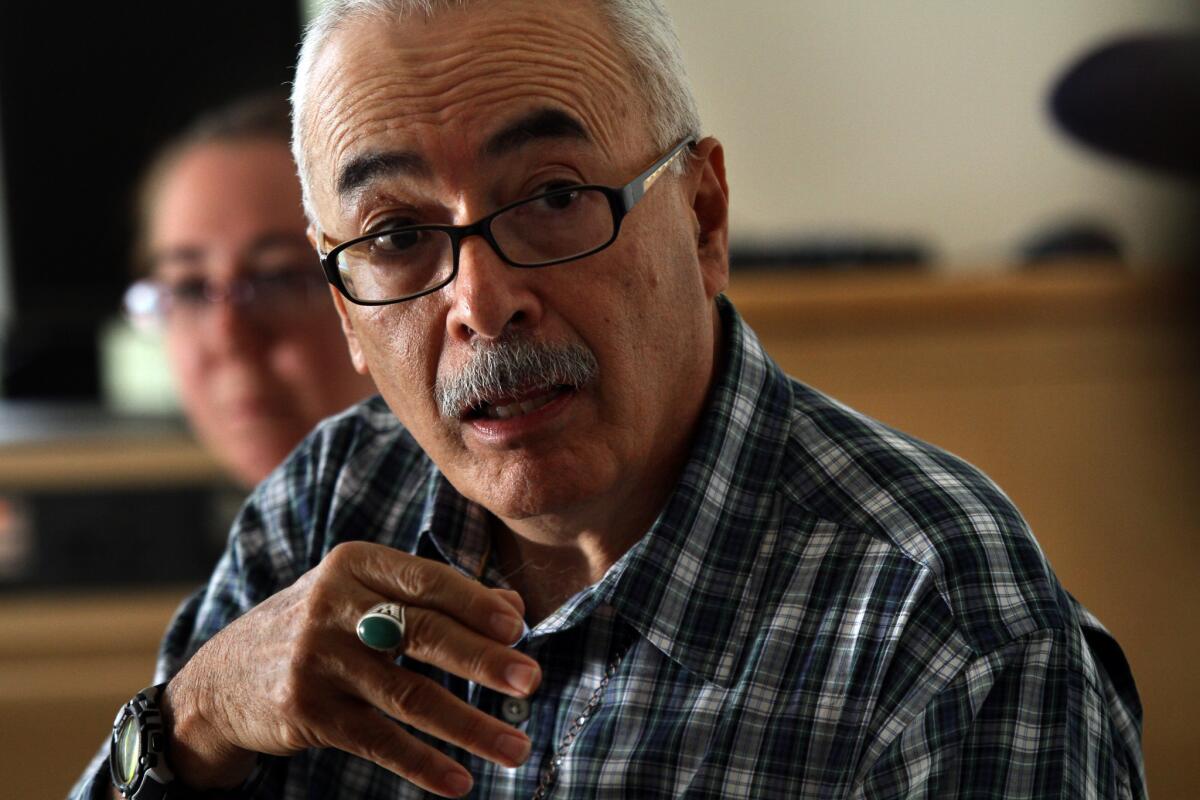California’s poet laureate likes to turn the tables

- Share via
When the poet laureate of California is invited to receptions and his hosts ask if there’s anything special he’d like to eat, Juan Felipe Herrera likes to give an irreverent answer: “How about some cilantro?”
Cilantro, an herb used in making guacamole and other dishes with roots in Latin America, is an essential element of California cuisine, though many Californians have never heard of it. Until recently, Herrera was also unknown to many Californians. These days, however, the self-described “laureate cilantro” speaks in an official capacity for California’s multitudes.
“Today — we stroll & wade & walk in freedom,” he began, in a poem he wrote last July for the dedication of Grand Park downtown. “In old timer Zoot suits ironed with Jitterbug light/ ajuuuaaah!/ In cranberry Hip Hop jazzy Rock Round Dance & Yiddish Klesmer/ Inner downtown peace and Taiko happiness.”
Herrera was named poet laureate in March 2012. In his official position, he’s ridden in a lowrider in San Francisco and spoken in open-air street festivals. Sometimes, he turns the tables and listens to students reading their work to him.
“The most important thing is your voice,” he told a group of Pasadena teens recently. “And my message to you is you have a beautiful voice. Tienen una voz hermosa.”
Herrera is uncommonly attuned to the wide variety of his audiences. He rarely does the same shtick twice. He can be erudite, comic or introspective. Usually, he’s self-effacing, as he was when speaking to the mostly African American and Latino students at La Pintoresca Park in Pasadena.
Recounting his youth in the San Joaquin Valley in the 1950s as the son of immigrant farmworkers, Herrera, 64, spoke of showing up for school with his lunch in a greasy paper bag, getting spanked for being late, and putting his hand up into the air when everyone started reciting the Pledge of Allegiance.
“I didn’t speak English, and I wanted to know what everyone was saying,” he said, provoking laughter.
Herrera asked the members of his student audience about their first memories of school, then listened to them recite poems about subjects as varied as Malcolm X and missing mothers and fathers. “We can write about something very painful, and once we do, that thing changes,” Herrera told them.
At his events, people come to celebrate poetry: listening, reciting or writing collective verses, or singing songs. “Everywhere I go I feel it,” he says. “People are ready to open a door they haven’t opened. People feel that they need to say something that’s very deep for them or very playful for them, or very serious, or that makes them angry.”
For Latino residents, young and old, seeing a Latino poet laureate is a deeply moving experience. Many have bad memories of seeing their own artistic impulses suppressed or discouraged by second-rate schools.
Herrera recounts meeting the farmworker legend Dolores Huerta, 83, at a dinner before an event in Bakersfield. She told him she loved to write poetry as a child. In her family, she was known as “la siete lenguas,” the seven tongues, for her ability with language.”But when I was in elementary school, I showed my teachers my poetry, and they said I couldn’t write,” Huerta told Herrera. “So I stopped writing.”
At the event that followed, Herrera informally pronounced Huerta “the poet laureate of Kern County.”
On that night, Herrera felt he was closing a circle. It’s a feeling that’s come to him often as poet laureate. He felt it on the campus of UC Santa Cruz, as he spoke to undergraduates in the Educational Opportunity Program for disadvantaged students. “I was in the first wave of EOP students back in 1967,” at UCLA, he said. In San Francisco, he was in a parade in the Mission District that passed by a bakery where he used to deliver tortillas in the 1950s as a young man. In the parade itself, he rode in a lowrider that at one point tilted sideways at a crazy 45-degree angle.
“I got a hold of the lowrider feeling,” he said. “It’s a very visceral, red-colored feeling. It was the viejitas [old women] and the young lovers on the corner smiling and clapping at us. A very warm, very joyful feeling.”
Along with publishing a collection of poems, “Senegal Taxi,” earlier in the year, Herrera has also undertaken several projects as poet laureate. He wrote a stage play in verse, produced at UC Riverside (where he also teaches) about the El Paso-born, 1930s pioneers of Chicano popular culture Cuca and Eva Aguirre. At many of his events, he asks people to write a few lines about unity, which he says he will gather into “the world’s biggest unity poem.” He’s worked with fifth-grade students in a writing project against bullying.
Besides encouraging others to write and celebrating their poetry, Herrera reads his own poems too. Or he might simply make up a few verses, on the spot, as he did at the Los Angeles City Hall last June, when his official recognition by the City Council ended with Council President Herb Wesson asking: “Can you lay one on us?”
“You’re putting me on the spot,” Herrera said. He looked around at the marble walls around him, gathered his thoughts, and began:
“In these halls of voices and these halls of many hearts, there is one light. It is the light from the streets, the light from the homes, the light from the families. Heart to heart. Word to word. Hand to hand. Mind to mind. As we spread these golden voices across California....”
More to Read
Sign up for our Book Club newsletter
Get the latest news, events and more from the Los Angeles Times Book Club, and help us get L.A. reading and talking.
You may occasionally receive promotional content from the Los Angeles Times.











